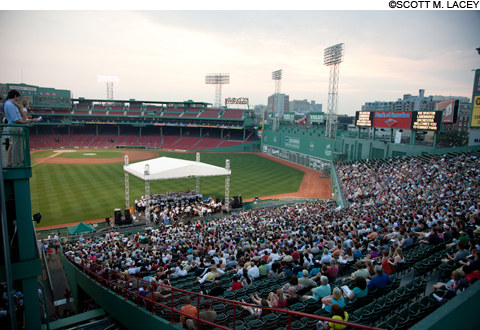
AND SOFT-SERVE! Plenty of hot dogs, too, but no one got beer poured on him or her at this Fenway event. |
"Free, friends, and Fenway Franks — all F's!" the young woman answered when I asked why she was at the very first symphonic concert at Fenway Park. "I've got one more F for you," she told me during the intermission, "Fantastic!" It was not your usual symphony audience; there were lots of kids and a wide spectrum of skin colors. Also pizza, hot dogs, fries, and soft-serve. "This is a lot different from the crowd that was at the game last week," someone else told me. "People have been very nice. Everyone's helping each other out. You don't get beer poured on you during a concert." Fifteeen thousand free tickets for last night's concert were distributed within three days of becoming available.
Celebrating their 10th anniversary, Charles Ansbacher and his Landmarks Orchestra have been bringing free classical-music concerts to public "landmarks" from the Boston Common and the Hatch Shell to neighborhood parks. And this concert was even more special. Mayor Thomas Menino welcomed us to "the best ballpark in America" and to the "orchestrarial" concert we were about to hear. And Governor Deval Patrick was part of the act, narrating with impassioned eloquence and precision
The Jackie Robinson Story, with a lively and colorful score (miles more imaginative that the vapid new Boston Pops piece celebrating the Kennedys) by Julian Wachner that included amusing and touching variations on "Take Me Out to the Ball Game" and an efficient and pointed text by Swanee Hunt, Ansbacher's wife. In it, she quotes Brooklyn Dodgers manager Branch Rickey as telling Robinson — when Jackie became the first player of color on a major-league baseball team (after being turned down by the Red Sox in a sham tryout) — that the team "needs a player with guts enough
not to fight back" against the inevitable racial hostility. This was a good — and brave — piece to play at Fenway Park.
The Landmarks' program was more like a traditional Boston Pops concert under Arthur Fiedler than current Pops concerts, an evening of mostly light classical music and Broadway tunes (here West Side Story— with its own image of racial hostility). We had music by Copland: Fanfare for the Common Man, with particularly strong brasses (the hot muggy weather wasn't always kind to the strings) and the "Hoedown" from Rodeo (much of the evening included clackety wood blocks). We had Leroy Anderson's Chicken Reel and Chabrier's España (both old Pops standards), and two Rossini overtures, one of them a shamefully abbreviated William Tell that wrecked the marvelous tension building up to the arrival of the Lone Ranger. (The concert was broadcast live by WCRB, a station that specializes in not playing complete pieces — but not even WCRB shortens overtures.)